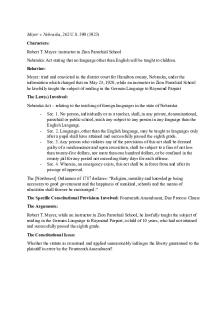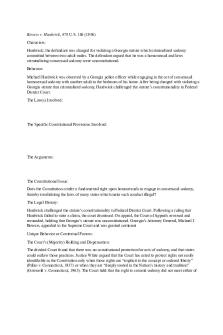Meyer v Nebraska - Lecture notes case brief PDF

| Title | Meyer v Nebraska - Lecture notes case brief |
|---|---|
| Author | Jozie Lowe |
| Course | Constit Law Ii/Civil Liberties |
| Institution | University of The Incarnate Word |
| Pages | 3 |
| File Size | 86.1 KB |
| File Type | |
| Total Downloads | 11 |
| Total Views | 189 |
Summary
professor metroka...
Description
Meyer v. Nebraska, 262 U.S. 390 (1923) Characters: Robert T. Meyer: instructor in Zion Parochial School Nebraska: Act stating that no language other than English will be taught to children. Behavior: Meyer: tried and convicted in the district court for Hamilton county, Nebraska, under the information which charged that on May 25, 1920, while an instructor in Zion Parochial School he lawfully taught the subject of reading in the German Language to Raymond Parpart The Law(s) Involved: Nebraska Act – relating to the teaching of foreign languages in the state of Nebraska. -
-
-
Sec. 1. No person, individually or as a teacher, shall, in any private, denominational, parochial or public school, teach any subject to any person in any language than the English Language. Sec. 2. Languages, other than the English language, may be taught as languages only after a pupil shall have attained and successfully passed the eighth grade. Sec. 3. Any person who violates any of the provisions of this act shall be deemed guilty of a misdemeanor and upon conviction, shall be subject to a fine of not less than twenty-five dollars, nor more than one hundred dollars, or be confined in the county jail for any period not exceeding thirty days for each offense. Sec. 4. Whereas, an emergency exists, this act shall be in force from and after its passage of approval.
The [Northwest] Ordinance of 1787 declares: “Religion, morality and knowledge being necessary to good government and the happiness of mankind, schools and the means of education shall forever be encouraged.” The Specific Constitutional Provisions Involved: Fourteenth Amendment, Due Process Clause The Arguments: Robert T. Meyer, while an instructor in Zion Parochial School, he lawfully taught the subject of reading in the German Language to Raymond Parpart, a child of 10 years, who had not attained and successfully passed the eighth grade. The Constitutional Issue: Whether the statute as construed and applied unreasonably infringes the liberty guaranteed to the plaintiff in error by the Fourteenth Amendment?
The Legal History: Plaintiff in error (Meyer) was tried and convicted in the district court for Hamilton county, Nebraska, under the information which charged that on May 25, 1920. The Supreme Court of the state affirmed the judgement of conviction. It declared the offense charged and established was “the direct and intentional teaching of the German language as a distinct subject to a child who has not passed the eighth grade,” in the parochial school maintained by Zion Evangelical Lutheran Congregation, a collection of Biblical stories being used therefore. And it held that the statute forbidding this did not conflict with the Fourteenth Amendment, but was a valid exercise of the police power. The Supreme Court of the state has held that “the so-called ancient or dead ‘languages’ are not ‘within the spirit or the purpose of the act.” Latin, Greek, Hebrew are not proscribed; but German, French, Spanish, Italian, and every other alien speech are within the ban. Unique Behavior or Contextual Factors: Defining of the Fourteenth Amendment - Liberty: “it denotes not merely freedom from bodily restraint but also the right of the individual to contract, to engage in any of the common occupations of life, to acquire useful knowledge, to marry, establish a home and bring up children, to worship God according to the dictates of his own conscience, and generally to enjoy those privileges long recognized at common law as essential to the orderly pursuit of happiness by free men.” The Court’s (Majority) Holding and Dispensation: The statute as applied is unconstitutional because it infringes on the liberty interests of the plaintiff and fails to reasonably relate to any end within the competency of the state. The Fourteenth Amendment encompasses more than merely the freedom from bodily restraint. The state argues that the purpose of the statute is to encourage the English language to be the native tongue of all children raised in the state. Nonetheless, the protection of the Constitution extends to those who speak other languages. Education is a fundamental liberty interest that must be protected, and mere knowledge of the German language cannot be reasonably regarded as harmful. The Court’s Expressed Reasoning (The Majority Opinion): The Nebraska law is unconstitutional. Nebraska violated the liberty protected by due process of the Fourteenth Amendment. Liberty means more than freedom form bodily restraint. State regulation of liberty must be reasonably related to a proper state objective. The legislature’s view of reasonableness was subject to supervision by the courts. The legislative purpose of the law was to promote assimilation and civic development. But these purposes were not adequate to justify interfering with Meyer’s liberty to teach or the liberty of parents to employ him during a “time of peace and domestic tranquility.”
“Plaintiff in error taught this language in school as part of his occupation. His right thus to teach and the right of parents to engage him so to instruct their children, we think, are within the liberty of the amendment.”
Concurring and Dissenting Opinions: Holmes and Sutherland dissented. Holmes wrote that he differed with the majority “with hesitation and unwillingness” because he thought the law did not impose an undue restriction on the liberty of the teacher since it was not arbitrary, was limited in its application to the teaching of children, and the State had areas where children might hear only a language other than English spoken at home. “I think I appreciate the objection to the law, but it appears to me to present a question upon which men reasonably might differ and therefore I am unable to say the Constitution of the United States prevents the experiment being tried.” Personal Notes:...
Similar Free PDFs

Lubitz v Wells Case Brief Notes
- 2 Pages

Wesson v. Walmart - case brief
- 2 Pages

Morse v Frederick Case Brief
- 2 Pages

Graham v Connor - Case Brief
- 1 Pages

Barrenblat v US Case Brief
- 2 Pages
Popular Institutions
- Tinajero National High School - Annex
- Politeknik Caltex Riau
- Yokohama City University
- SGT University
- University of Al-Qadisiyah
- Divine Word College of Vigan
- Techniek College Rotterdam
- Universidade de Santiago
- Universiti Teknologi MARA Cawangan Johor Kampus Pasir Gudang
- Poltekkes Kemenkes Yogyakarta
- Baguio City National High School
- Colegio san marcos
- preparatoria uno
- Centro de Bachillerato Tecnológico Industrial y de Servicios No. 107
- Dalian Maritime University
- Quang Trung Secondary School
- Colegio Tecnológico en Informática
- Corporación Regional de Educación Superior
- Grupo CEDVA
- Dar Al Uloom University
- Centro de Estudios Preuniversitarios de la Universidad Nacional de Ingeniería
- 上智大学
- Aakash International School, Nuna Majara
- San Felipe Neri Catholic School
- Kang Chiao International School - New Taipei City
- Misamis Occidental National High School
- Institución Educativa Escuela Normal Juan Ladrilleros
- Kolehiyo ng Pantukan
- Batanes State College
- Instituto Continental
- Sekolah Menengah Kejuruan Kesehatan Kaltara (Tarakan)
- Colegio de La Inmaculada Concepcion - Cebu










